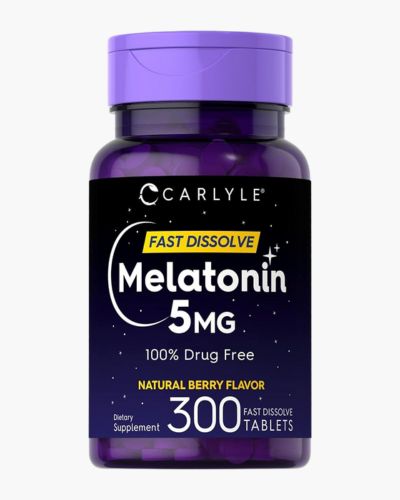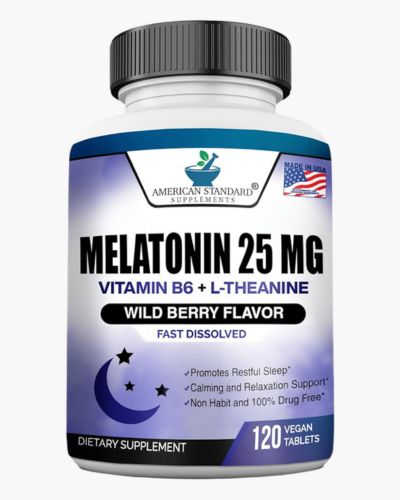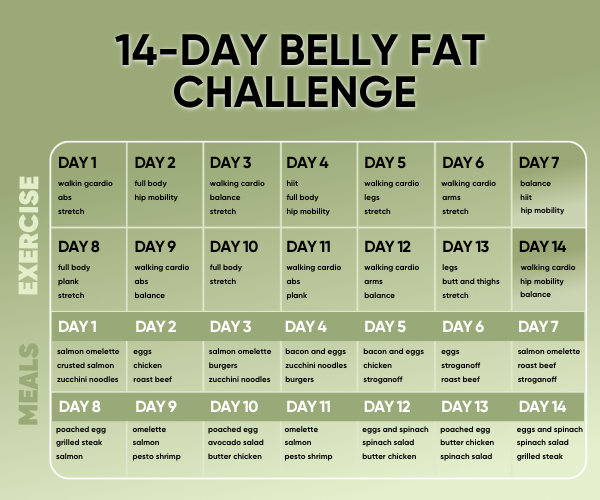
Melatonin is a natural hormone made in the pineal gland, the retina, and the digestive tract. It controls our internal clocks and sleep-wake cycles.
Light from screens and fluorescent lights lowers melatonin production, while darkness raises it. Melatonin levels naturally drop as we get older, and some scientists believe this could be a sign of getting older.
Stress, jet lag, working shifts, and staying up all night can all stop the production of melatonin, which can make you feel mentally sluggish and irritable.
More melatonin has been linked to better memory and brain function, according to research. Keeping melatonin levels high can be especially good for the brain health of women over 50.
Melatonin is also an antioxidant, which means it keeps cells from getting hurt. This is very important because free radicals can damage cells more as we age.
It is important to limit blue light in the evening, spend less time in front of a screen, or use blue light filters on your devices to keep your melatonin levels healthy. Creating a dark, cool sleep environment and going to bed at the same time every night can help your body make more melatonin. It is also good to deal with stress by relaxing with yoga, meditation, or deep breathing exercises.
Melatonin supplements might help people who have trouble sleeping if they talk to their doctor about them. Melatonin levels can affect how well you sleep and your overall health, especially for women over 50.
READ ALSO: 10 Tips For Better Sleep When You Are Over 50
The Role of Melatonin in Memory and Longevity

Although most people associate melatonin with sleep, this incredible molecule has many other uses as well. Due to its antioxidant properties and ability to modulate physiological processes, it may improve memory and longevity. Melatonin may help brain health and aging by fighting oxidative stress and inflammation.
Many studies have looked into the connection between melatonin and memory and have found interesting results. Research suggests that melatonin may protect brain cells from harm and aging due to its neuroprotective properties. This defense mechanism might help make it easier to make, store, and retrieve memories.
Melatonin has also been linked to better neuroplasticity, which is the brain’s ability to change the way neural pathways are organized and respond to new information. In theory, this neuroplasticity could make learning and memory easier, making it easier to store and find information.
A lot of research has been done on humans to see how melatonin affects their memories. A few studies have found improvements in working memory, episodic memory, and verbal memory in older adults or people with mild cognitive impairment.
Melatonin may slow Alzheimer’s and other dementia-related cognitive decline, according to early research. These conditions may damage brain cells, but melatonin’s antioxidant and anti-inflammatory properties may slow cognitive decline.
While these studies are promising, more research is needed to fully understand how melatonin affects memory and establish its clinical efficacy.
Benefits of Melatonin for Longevity

Beyond its potential impact on memory, melatonin has been linked to various aspects of longevity and healthy aging.
Melatonin reduces oxidative stress by neutralizing free radicals. Thus, it fights oxidative damage to slow aging and reduce age-related diseases.
Chronic inflammation is the root cause of age-related diseases like cancer, heart disease, and neurodegenerative disorders. Melatonin might lessen the bad effects that long-term inflammation has on health and longevity.
Melatonin helps regulate the immune system for a balanced response. An immune system that works well keeps you healthy and helps you live longer.
Mitochondria are the energy-producing parts of cells and are necessary for them to work. Researchers have found that melatonin protects mitochondria from oxidative damage. This may help keep cellular energy levels high and improve the health of cells overall, which is very important for living a long life.
When applied to skin, melatonin may improve tone, hydration, and texture, which may reduce wrinkles and other signs of aging. Studies show that it can also help wounds heal and treat skin conditions like eczema and vitiligo. It also blocks UV rays. Melatonin may also help the body make collagen, which may help keep skin flexible as we age.
READ ALSO: How Women Over 50 Are Redefining Longevity and Successful Aging
How Women Over 50 Can Increase Their Melatonin Levels

Our melatonin levels naturally drop as we get older, which can make it hard to sleep. There are simple ways to increase melatonin.
First, try to spend less time in blue light in the evening. Blue light from screens, like those on phones, tablets, and computers, can stop the production of melatonin. For this, you could use glasses or blue light filters on your devices. Before bed, try to spend less time in front of a screen. You should read a book or listen to soothing music instead.
Making your bedroom dark and cool can also help. Make sure your bedroom stays cool and dark with blackout curtains. It is also important to stick to a regular sleep schedule. No matter what day it is, go to bed and wake up at the same time. This helps keep your body’s internal clock in sync and encourages the production of melatonin.
Another important factor is dealing with stress. Stress can lower melatonin levels, so it is important to find ways to calm down. Doing yoga, meditation, or deep breathing exercises can help you relax and sleep better.
If you still can not fall asleep, you might want to talk to your doctor about taking melatonin supplements. They can help you sleep and wake up at the right times, which is helpful if you have jet lag or work odd hours. However, it is always best to talk to a doctor or nurse before starting a new supplement.
READ ALSO: 20 Amazing Sleep Products For a Good Night’s Rest
Recommended Products



How to take melatonin for memory and longevity

You should consult a doctor before adding melatonin to your routine for memory and longevity benefits, especially if you have a medical condition or are taking medications. Here are some general guidelines for taking melatonin:
Dosage: Melatonin dosage depends on factors and purpose. For memory and longevity, doses are usually 0.5 to 10 mg per day. Start with a low dose and gradually increase it under medical supervision.
Timing: Melatonin is often taken before bed to help people fall asleep because it helps keep the sleep-wake cycle calm. The timing may not be as important for memory and longevity benefits, though, and melatonin can be taken at any time of the day.
Sustained-release formulations: Some people may benefit from taking melatonin in the form of sustained-release or extended-release supplements, which release the supplement more slowly over a longer period of time.
Lifestyle factors: Living a healthy life with regular exercise, a balanced diet, and stress-reduction techniques is important to get the most out of melatonin. These things can improve your overall health and may make melatonin work better.
Keep in mind that if you take too much melatonin, you might feel sleepy during the day, have trouble sleeping or staying asleep, get headaches, have mood swings, or have stomach or nausea problems.
Closing thoughts
Based on the research that has been done so far, melatonin seems like it could help with memory and encourage longevity. It’s potentially worth considering as a natural supplement due to its antioxidant, anti-inflammatory, and neuroprotective qualities.
It’s important to keep in mind that more research is needed to fully understand how melatonin works and whether it is clinically useful for these purposes.
Even though melatonin might be helpful, it is important to look at your health and well-being as a whole. Melatonin may help your brain work better and make you live longer when combined with a healthy diet, regular exercise, stress-reduction techniques, and other natural remedies.




















